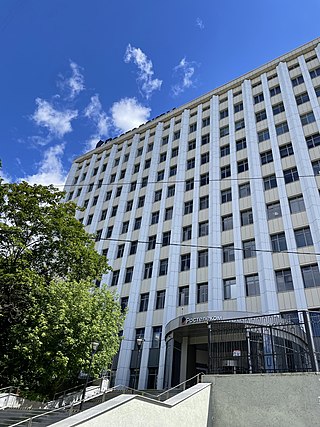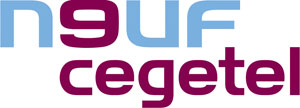
Telefonaktiebolaget LM Ericsson, commonly known as Ericsson, is a Swedish multinational networking and telecommunications company headquartered in Stockholm, Sweden. The company sells infrastructure, software, and services in information and communications technology for telecommunications service providers and enterprises, including, among others, 3G, 4G, and 5G equipment, and Internet Protocol (IP) and optical transport systems. The company employs around 100,000 people and operates in more than 180 countries. Ericsson has over 57,000 granted patents.

Telia Company AB is a Swedish multinational telecommunications company and mobile network operator present in Sweden, Finland, Norway, Estonia, Latvia and Lithuania.

The Socialist Federal Republic of Yugoslavia, commonly referred to as Socialist Yugoslavia or simply Yugoslavia, was a country in Central and Southeast Europe. It was established in 1945 as the Federal People's Republic of Yugoslavia, following World War II, and lasted until 1992, breaking up as a consequence of the Yugoslav Wars. Spanning an area of 255,804 square kilometres (98,766 sq mi) in the Balkans, Yugoslavia was bordered by the Adriatic Sea and Italy to the west, Austria and Hungary to the north, Bulgaria and Romania to the east, and Albania and Greece to the south. It was a one-party socialist state and federation governed by the League of Communists of Yugoslavia, and had six constituent republics: Bosnia and Herzegovina, Croatia, Macedonia, Montenegro, Serbia, and Slovenia. Within Serbia was the Yugoslav capital city of Belgrade as well as two autonomous Yugoslav provinces: Kosovo and Vojvodina.
Sony Mobile Communications Inc. was a multinational telecommunications company founded on October 1, 2001, as a joint venture between Sony Corporation and Ericsson. It was originally incorporated as Sony Ericsson Mobile Communications, and headquartered in London, England, until Sony acquired Ericsson's share in the venture on February 16, 2012. On April 1, 2021, Sony integrated its electronics businesses including Sony Mobile into one company called Sony Corporation.
The Plessey Company plc was a British electronics, defence and telecommunications company. It originated in 1917, growing and diversifying into electronics. It expanded after World War II by acquisition of companies and formed overseas companies. It was listed on the London Stock Exchange and was a constituent of the FTSE 100 Index. In 1989, it was taken over by a consortium formed by GEC and Siemens which split the assets of the Plessey group.

Vodafone Group Plc is a British multinational telecommunications company. Its registered office and global headquarters are in Newbury, Berkshire, England. It predominantly operates services in Asia, Africa, Europe, and Oceania.
Hrvatski Telekom, also known as HT or Telekom, is a Croatian telecommunications company founded in 1998. Headquartered in Zagreb, it is majority-owned by Deutsche Telekom with a 53.5% stake and is publicly traded on the Zagreb Stock Exchange.

Marconi Communications, the former telecommunications arm of Britain's General Electric Company plc (GEC), was founded in August 1998 through the amalgamation of GEC Plessey Telecommunications (GPT) with other GEC subsidiaries: Marconi SpA, GEC Hong Kong, and ATC South Africa.
The economy of the Socialist Federal Republic of Yugoslavia (SFRY) was a unique system of socialist self-management that operated from the end of World War II until the country's dissolution in the 1990s. The Yugoslav economy was characterized by a combination of market mechanisms and state planning, with a focus on worker self-management and a decentralized approach to decision-making. Despite facing numerous challenges, including political instability and external pressures, the Yugoslav economy achieved significant growth and modernization during its existence, with a particularly strong emphasis on education, health care, and social welfare. However, the system ultimately proved unsustainable in the face of the global economic changes of the 1980s and the political tensions that led to the breakup of Yugoslavia in the 1990s. Despite common origins, the Yugoslav economy was significantly different from the economies of the Soviet Union and other Eastern European socialist states, especially after the Yugoslav-Soviet break-up in 1948.
A1 Hrvatska d.o.o. is a Croatian telecommunications company owned by A1 Telekom Austria Group launched in July 1999.

Nikola Jurčević is a Croatian professional football manager and former player.

Rostelecom (Ростелеком) is Russia’s largest provider of digital services for a wide variety of consumers, households, private businesses, government and municipal authorities, and other telecom providers. Rostelecom interconnects all local public operators’ networks into a single national network for long-distance service. In other words, if one makes a long-distance call or originates Internet contact to or from Russia, it is likely that Rostelecom is providing part of the service. The company's stock trades primarily on the Moscow Exchange.

Neuf Cegetel was a French wireline telecommunications service provider and a mobile virtual network operator (MVNO). It offered various telecommunications services to consumers, enterprises and wholesale customers, ranking second in the country in annual revenues. It was legally established in 2005 following the completion of the merger between Neuf Telecom and Cegetel. As of June 2008, the company became a wholly owned subsidiary of SFR, and the brand disappeared commercially.

The music of Yugoslavia refers to music created during the existence of Yugoslavia, spanning the period between 1918 and 1992. The most significant music scene developed in the later period of the Socialist Federal Republic of Yugoslavia, and includes internationally acclaimed artists such as: the alternative music acts Laibach and Disciplina Kičme which appeared on MTV; classical music artists such as Ivo Pogorelić and Stefan Milenković; folk artists such as the Roma music performer Esma Redžepova; the musicians of the YU Rock Misija contribution to Bob Geldof's Band Aid; the Eurovision Song Contest performers such as the 1989 winners Riva and Tereza Kesovija, who represented Monaco at the Eurovision Song Contest 1966 and her own country in 1972, and plenty of others.
Privatization in Croatia refers to political and economic reforms which include the privatization of state-owned assets in Croatia. Privatization started in the late 1980s under Yugoslav Prime Minister Ante Marković and mostly took place in the 1990s after the breakup of Yugoslavia, during the presidency of Franjo Tuđman and the rule of his party Croatian Democratic Union (HDZ), and continued in the 2000s with the privatization of large state enterprises. Many aspects of the privatization process are still seen as controversial as the political and economic turmoil, coupled with the events of the simultaneous 1991–95 independence war, are thought to have led to a degree of criminal activity.

Saša Vlaisavljević is a CEO and the President of Executive Board of Belgrade Nikola Tesla Airport He is a Serbian engineer, business executive, and a politician.
The Yugoslavia national rugby union team used to represent Yugoslavia at Rugby union until the 1990s.

Televerket was a Swedish State authority acting as a state-owned corporation, responsible for telecommunications in Sweden from 1853 until 1993. Originally it was named Kongl. Elektriska Telegraf-Werket, which was founded in 1853. Its name changed to Kongl. Telegrafverket in 1871, Kungl. Telegrafverket in 1903, the prefix Kungl. was dropped in 1946 and the name was further modernised to Televerket in 1953. Televerket continued on with its telecommunications monopoly until corporatisation in 1993, when it was renamed Telia, now part of Telia Company.

Imlek a.d. is a Serbian food company based in Belgrade, Serbia. It is specialized in processing milk and produces dairy products.











